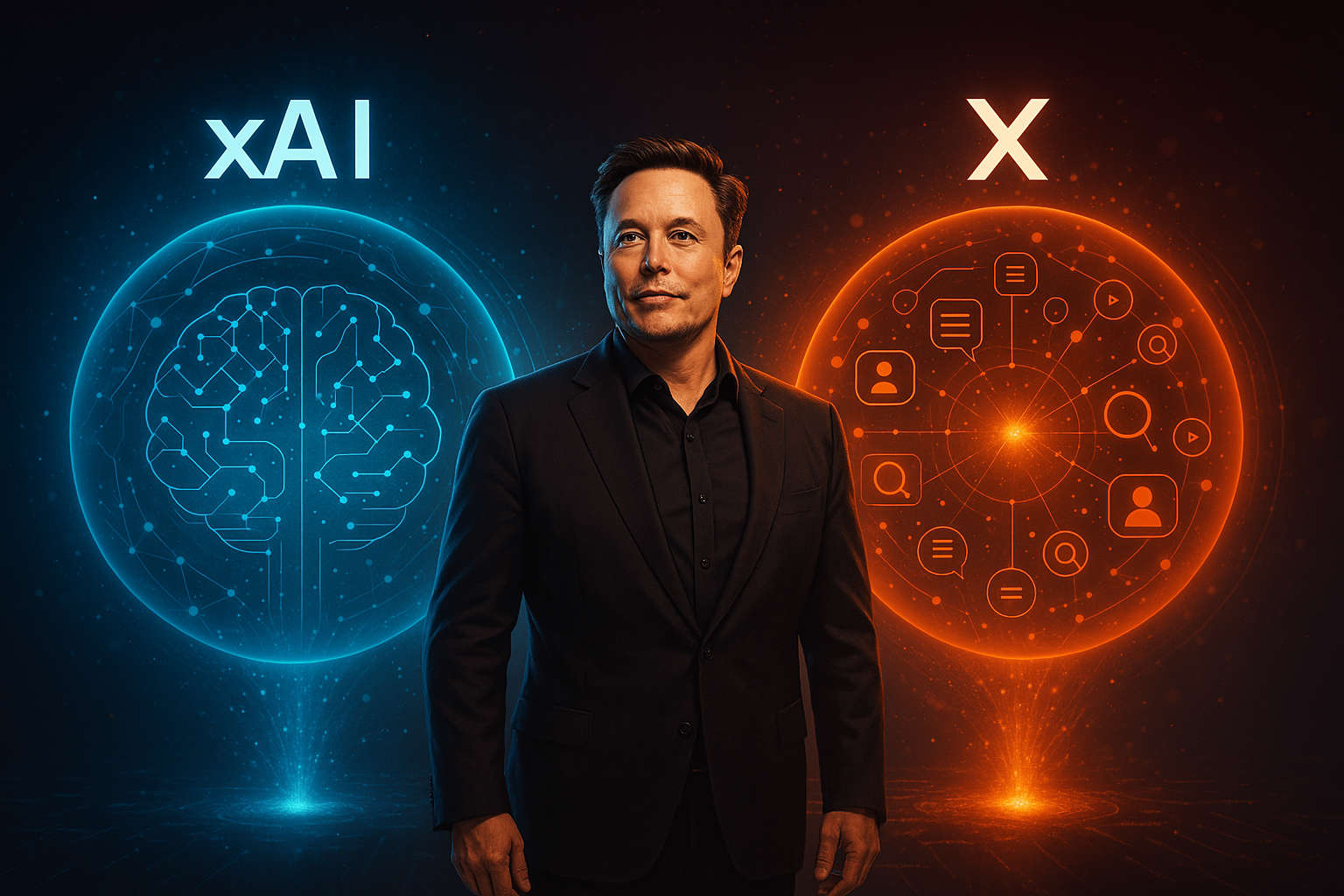Elon Musk Merges xAI with X - The AI Power Move That Could Redefine Social, Search, and Beyond

Elon Musk Merges xAI with X: The AI Power Move That Could Redefine Social, Search, and Beyond
In a move that could reshape the landscape of the internet itself, Elon Musk has officially merged his artificial intelligence company, xAI, with X—formerly known as Twitter. It’s not just a business integration—it’s a statement of intent. Musk isn't just betting on AI as a feature; he’s building it into the bloodstream of what he calls “the everything app.”
What does this mean? For starters, it marks the beginning of a radical transformation in how we use social media, search the web, and interact with digital platforms. With xAI now infused into X, Musk is setting the stage for a platform that thinks with you, speaks to you, and learns from you in real time.
At the center of this revolution is Grok, xAI’s conversational AI, already rolling out to premium X users. Grok isn’t just another chatbot—it’s designed to be witty, irreverent, and plugged into the real-time pulse of X. That means live event summarization, on-the-fly information retrieval, and eventually, Musk hints, a full-blown rival to Google Search—but deeply integrated into a social network.
Let that sink in: A platform where news breaks, trends form, and now—intelligence is natively built in.
The Implications: Social Intelligence Meets Search 2.0
The merger is more than a tech headline—it’s a blueprint for the next era of digital platforms. Imagine asking your feed not just what’s happening, but why it matters. Picture a search engine that doesn't send you to ten blue links but instead pulls insights directly from expert voices, viral conversations, and live data streams. This is the future Musk is charging toward.
And it goes further. With Musk’s ambitions for X to become a hub for payments, video, hiring, and news, the integration of AI unlocks something powerful: real-time content generation, personalized discovery, and predictive interaction.
Suddenly, “scrolling your feed” becomes a dynamic experience. An AI-curated world tuned to your interests, your needs, and even your mood. For marketers, creators, and entrepreneurs, that’s not just a new interface—it’s a new playing field.
But Musk’s power play is just one piece of a larger, accelerating puzzle.
Apple’s AI Health Coach: The Quiet Revolution in Wellness
While Musk is building AI into the social fabric, Apple is weaving it into your body.
In its upcoming software suite, Apple is expected to debut an AI-powered health coach—a personalized, proactive system that tracks activity, nutrition, and sleep to give real-time feedback and guidance. Think of it as Siri with a medical degree and a Fitbit strapped on.
This move signals a broader shift: AI is no longer just a reactive assistant—it’s becoming an active partner in daily life.
For the $4.4 trillion wellness industry, this could be seismic. With Apple’s deep integration into wearables (Apple Watch), health records, and ecosystem control, the health coach is positioned to deliver hyper-personalized, preventative care—long before you ever see a doctor.
Startups in health tech, fitness, and lifestyle should be paying close attention. Apple just raised the bar on what consumers expect from their digital health experience.
OpenAI’s Internal Drama: Innovation’s Double-Edged Sword
But amid this momentum, there’s also turbulence. OpenAI—the lab behind ChatGPT—continues to wrestle with internal governance challenges. The fallout from last year’s leadership crisis, which saw Sam Altman briefly ousted and then reinstated, has resurfaced, revealing deep philosophical rifts over safety, speed, and control.
While OpenAI remains a powerhouse in AI development, the drama highlights a core truth: the bigger the breakthrough, the higher the stakes.
For product leaders and founders, it’s a reminder that innovation isn’t just about code—it’s about culture, values, and alignment. Moving fast is exhilarating. But without clarity and cohesion, even the most advanced teams can spiral.
It’s also a lesson in transparency. As AI systems gain influence, trust becomes a competitive edge. Users and investors alike are demanding more than just performance—they want accountability.
Oxford’s Alzheimer’s Breakthrough: AI in the Lab, Saving Lives
Meanwhile, in a quieter corner of the world, one of the most profound impacts of AI is taking shape—in medicine.
Oxford scientists recently announced they’ve accelerated the discovery of potential Alzheimer’s treatments using AI, analyzing massive datasets to identify promising compounds in a fraction of the time traditional methods would take.
This isn’t theoretical. It’s happening. And it means that AI is collapsing scientific timelines, unlocking breakthroughs that once took decades.
In the context of global healthcare challenges—aging populations, drug-resistant diseases, rising costs—AI’s role as a co-researcher could be transformative. Not just faster results, but better ones. More personalized, more precise, and more cost-effective.
Startups in biotech, pharma, and medtech now face a critical choice: evolve with AI at your core, or risk becoming obsolete.
What This Means For Us
If you’re building a product, leading a team, or steering a company, here’s the bottom line:
AI isn’t coming—it’s already here. And it’s moving faster than most of us are ready for.
Whether it's Elon reimagining social media, Apple turning wearables into wellness guides, or scientists discovering life-saving drugs in weeks, not years—this is the inflection point.
The question is no longer if your business should integrate AI, but how fast and how deeply you can do it.
Here’s what matters now:
- Adaptability: Can your systems evolve in real time, as AI reshapes expectations?
- Integration: Is AI woven into the heart of your product, or bolted on as an afterthought?
- Bold Execution: Are you experimenting at the edges, or leading from the front?
This is the moment to rethink your product roadmap, your marketing playbook, and your infrastructure strategy.
The future isn’t just arriving—it’s being engineered in real time. If you’re ready to build smarter, faster, and ahead of the curve, we should talk. Because in this new era, speed favors the bold—and intelligence favors the integrated.
